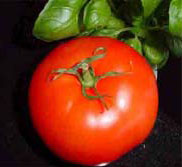Saturday, February 28, 2004
Carrots Love Tomatoes
 Many years ago when I began my foray into vegetable gardening, I stumbled across a little paperback book entitled Carrots Love Tomatoes – Secrets of Companion Planting for Successful Gardening by Louise Rotte. Armed with my Saturday morning coffee and a green highlighter I curled up on the sofa and began reading. Within an hour, the poor book looked as though it had been through a war. Many pages were dog-eared and MANY entries were highlighted in green.
Many years ago when I began my foray into vegetable gardening, I stumbled across a little paperback book entitled Carrots Love Tomatoes – Secrets of Companion Planting for Successful Gardening by Louise Rotte. Armed with my Saturday morning coffee and a green highlighter I curled up on the sofa and began reading. Within an hour, the poor book looked as though it had been through a war. Many pages were dog-eared and MANY entries were highlighted in green.
The following week I went to my favorite gardening store (everyone has one) and picked up a variety of vegetable seeds. After properly preparing my beds (that’s another article I’ll share soon), I proceeded to plant using the advice gleaned from my little paperback book.
Needless to say, the vegetables were stunning that year and every year thereafter. Here are a few glimpses into what you can expect if you find this book:
- Nasturtiums planted with squash will keep away squash bugs, but be sure to give the flowers a head start since the squash will grow more quickly.
- Tomatoes, interplanted with marigolds, will grow and produce better.
Marigolds also discourage nematodes from potatoes and strawberries, and protect beans from the Mexican bean beetle. The plants with a strong odor in both foliage and blossom are considered the most useful. - Cucumbers and corn are friends. Cucumbers are offensive to raccoons while corn seemingly protects the cucumbers against the virus that causes wilt.
- Carrots grow well with tomatoes but dislike dill and apples.
This fantastic little book covers everything from Absinthium to Yucca and many, many species in between. I highly recommend Ms. Riotte’s book as you plan your 2004 vegetable garden. A revised edition can be purchased at Booksamillion for as little as $10.02 if you’re a club member, as I am, or Amazon.com for $10.47. Enjoy the discovery of companion planting in your garden this year. Happy Gardening.
Comments:
Post a Comment

This work is licensed under a Creative Commons License.
Thanks to Andrew Stenning who contributed the photograph for our masthead


